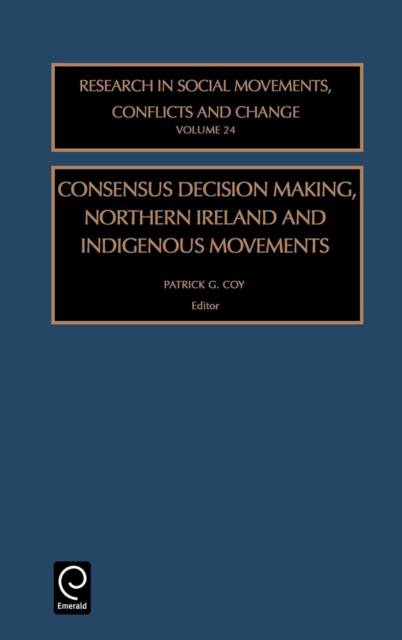
- Afhalen na 1 uur in een winkel met voorraad
- Gratis thuislevering in België vanaf € 30
- Ruim aanbod met 7 miljoen producten
- Afhalen na 1 uur in een winkel met voorraad
- Gratis thuislevering in België vanaf € 30
- Ruim aanbod met 7 miljoen producten
Zoeken
Consensus Decision Making, Northern Ireland and Indigenous Movements
€ 136,95
+ 273 punten
Omschrijving
Decision making is the oil that greases the wheel of social movement organizing. Done poorly, it derails organizations and coalitions; done well, it advances the movement and may model those changes movements seek to effect in society. Despite its importance, movement decision making has been little studied. Section One makes a singular contribution to the study of social movement decision making through seven focused case studies, followed by a critical commentary. The case studies on decision making cut across a wide breadth of social movement contexts, including Peace Brigades International teams, a feminist bakery collective, Earth First, the NGO Forum on Women, Friends of the Earth, the Tlapanec indigenous movement in Mexico, an on-line strategic voting campaign, and Korean labor movements. The section concludes with Jane Mansbridge's synthesis and critical commentary on the papers, wherein she continues to make her own substantive contributions to the literature on consensus decision making. The three papers in Section Two focus on Northern Ireland, where frustration with inter-community conflict resolution spawned a movement promoting intra-community or 'single tradition' programs. Two chapters provide invaluable comparative studies of the benefits and shortcomings of these counter-movements, while the third paper applies constructive conflict and nonviolent action theories to recent developments in the annual parades disputes. The volume closes with two papers on Native American issues. The first examines an initiative to teach conflict history and build conflict analysis and resolution skills among the Seneca Nation. The final case study of two Native American women's organizations demonstrates how socially constructed identities are critical to movement framing processes and collective actions. With this volume, RSMCC continues its long-standing tradition of publishing cutting edge studies in social movements, conflict resolution, and social change.
Specificaties
Betrokkenen
- Uitgeverij:
Inhoud
- Aantal bladzijden:
- 464
- Taal:
- Engels
- Reeks:
- Reeksnummer:
- nr. 24
Eigenschappen
- Productcode (EAN):
- 9780762307876
- Verschijningsdatum:
- 1/12/2002
- Uitvoering:
- Hardcover
- Formaat:
- Genaaid
- Afmetingen:
- 156 mm x 234 mm
- Gewicht:
- 820 g

Alleen bij Standaard Boekhandel
+ 273 punten op je klantenkaart van Standaard Boekhandel
Beoordelingen
We publiceren alleen reviews die voldoen aan de voorwaarden voor reviews. Bekijk onze voorwaarden voor reviews.










